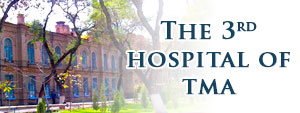SCIENTIFIC PROBLEM OF DEPARTMENT
Yakubov A.V., Rakhmatullayeva G. K., Parpibayeva D. A., Khudoiberganova N. H., Azimova M. M. “Comparative evaluation of the effectiveness of some proton pump inhibitors, cytoprotectors and their combinations on the regeneration processes in the gastric mucosa in indomethacin gastropathy”. Bulletin of the TMA. 2020, №6. Р.104-106.
Zufarov P. S., Yakubov A.V., Aripdzhanova Sh. S., Saidova Sh. A., Musaeva L. J. “Comparative evaluation of the effectiveness of omeprazole in the treatment of gastropathy in patients with rheumatoid arthritis”. Science and practice: Implementation to modern society. Manchester. Great Britan. 25-28 Desember, 2020. № 3(39). P.1331-1340.
Zufarov P. S., Akbarova D. S., Pulatova D. B., Abdusamatova D. Z. Aripdzhanova Sh. S., Pulatova N. I. Analysis of the effectiveness of a calcium and vitamin D3-containing drug for the prevention and treatment of osteoporosis in patients with chronic obstructive pulmonary disease taking inhaled glucocorticosteroids. Scientific Collection «InterConf», №(41): with the Proceedings of the 7 th International Scientific and Practical Conference «Scientific Horizon in The Context of Social Crises» (February 6-8, 2021). Tokyo, Japan: 2021. Р.807-811..
“Features of change of the pathogenetic mechanisms in the development of various pathological conditions and development of optimal drug regimens”
State registration number: 01.070070
NAME OF WORK
On clinical and experimental studies to examine changes particularity aggressively protective factors in the gastric mucosa in association with H. pylori in patients with duodenal ulcer and evaluate the effectiveness of components and circuits second-line therapy on the relationship between these factors.
BRIEF DESCRIPTION OF SCIENCE
Peptic ulcer disease is a chronic relapsing disease that occurs as a result of violations of the relationship between aggressive factors and protective capabilities of gastroduodenal zone. Recent years have been characterized stabilization and, in some countries, even the tendency to reduce the incidence of peptic ulcer disease due to the introduction into clinical practice of new approaches to the treatment of this disease. However, the number of ulcer complications (bleeding, perforation, stenosis) remains at a high level, and the number of patients who required treatment for ulcer bleeding, even slightly increased. In this regard, treatment of patients with peptic ulcer disease, the prevention of its recurrence and complications are not only medical but also a social problem. Peptic ulcer treatment of choice – is eradication of infection Helicobacter pylori, which allows successful. Ulcer healing, prevent recurrence of the disease, to avoid complications. Current approaches to diagnosis and treatment of infection Helicobacter pylori, meeting the requirements of evidence-based medicine are reflected in the outcomes of international conferences held in the city of Maastricht.
As the analysis of literature data, is currently almost no research devoted to the study of the influence of circuits and components of second-line therapy for protective factors, and mainly devoted to the study of the existing impact of these schemes on the factors and microbial acidopeptic aggression.
Until now, the question remains unexplained absence of ulcers in the presence of Helicobacter pylori, or vice versa. No questions explored the influence of H. pylori therapy on other pathogenic mechanisms ulcerogenesis.
Currently, perhaps there are three ways to overcome these problems:
- Isolation of a microorganism and determining its sensitivity to antibiotics.
- Elongation treatment period.
- Using a back-up therapy and new antibiotics with H. pylori activity.
The first two ways are not feasible, due to the fact that the determination of sensitivity to antibiotics expensive procedure, and lengthening the period of treatment results in a significant increase in the incidence of adverse effects. That leaves the third way to overcome – the development of new treatment or detection and the use of new antibiotics with H. pylori activity.
Based on the above, and given the broad perspective of use of second-line regimens in the treatment of peptic ulcer disease was considered appropriate to study the influence of components and circuits second-line therapy for aggressive relationship. Protective factors in the stomachoduodenal mucosa in the treatment of peptic ulcer.
Preparations second-line treatment of peptic ulcer have divergent pharmacodynamical actions of the state of the mucous barrier. Omeprazole, metronidazole, furazolidone suppress de-nol stimulates and tetracycline, amoxicillin does not affect the synthesis of the mucosal barrier. Synthesis is stimulated by mucosal barrier quadrotherapy with omeprazole, de-nol, amoxicillin, tetracycline, does not change with triple therapy with omeprazole, amoxicillin, tetracycline, and is inhibited by quadrotherapy with omeprazole, de-nol, tetracycline and metronidazole and triple therapy with omeprazole, amoxicillin and furazolidone.
One of the reasons to reduce the synthesis of mucosal barrier with omeprazole, metronidazole and furazolidone is their inhibitory effects on enzymes monooxygenasis system for NO formation system and stimulating effect on the processes of lipid peroxidation in the stomach mucosa tissue. The plan of correction pathogenetic mechanisms cytoprotection effective is the use of de-nol, amoxicillin and tetracycline did not affect these mechanisms. In applying quadrotherapy omeprazole de ethanol, amoxicillin, tetracycline, and triple therapy with omeprazole, amoxicillin, tetracycline positive pharmacodynamical drug interactions on the mechanisms of cytoprotection appears as an additive synergy. In applying quadrotherapy omeprazole de ethanol, tetracycline, and metronidazole triple therapy with omeprazole, amoxicillin, furazolidone reduced cytoprotection mechanisms, due to potentiation of the inhibitory effect of omeprazole pharmacodynamical, metronidazole and furazolidone.
In the treatment of Helicobacter pylori associated ulcers standard circuit quadrotherapy second line with omeprazole, de-nol, amoxicillin, tetracycline and omeprazole, de-nol, tetracycline, metronidazole are affecting the dynamics of clinical symptoms and the frequency of eradication of H. pylori. However, quadrotherapy with omeprazole, de-nol, amoxicillin, tetracycline more effectively affect the mechanisms of impaired synthesis of protective mucus barrier and regeneration, resulting in a higher frequency of scarring ulcers in patients with duodenal ulcer.












